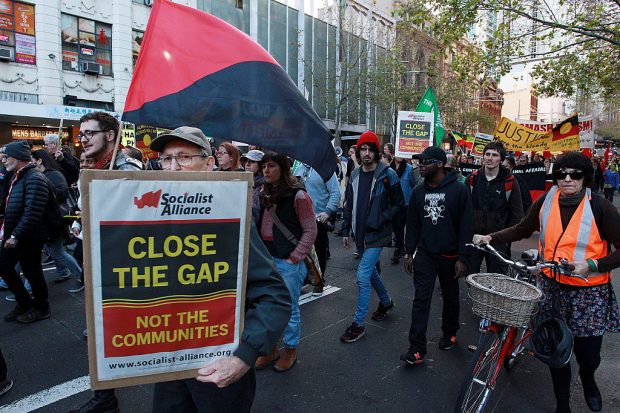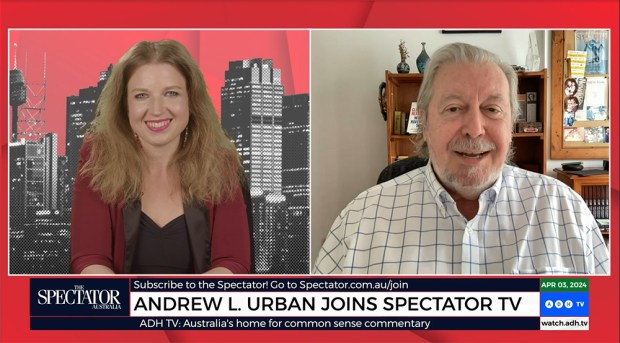 We are all racists now. Noel Person tells us so. The “hard bigotry” of Quadrant conservatism has merged with the “soft bigotry” of the ABC. The two have met in “the common ground of mutual racism” and created wall-to-wall, surround-sound White Man noise.
We are all racists now. Noel Person tells us so. The “hard bigotry” of Quadrant conservatism has merged with the “soft bigotry” of the ABC. The two have met in “the common ground of mutual racism” and created wall-to-wall, surround-sound White Man noise.
The national broadcaster, according to Pearson, is “a spittoon’s worth of perverse people willing the wretched to fail”. Yet it was the ABC’s Australian Story program in 2002 that first provided a platform for Noel Pearson and his brother Gerhardt to unveil their Cape York project. Self-regulating outback Indigenous communities, the Pearsons disclosed, were not happy or sober places and the Aboriginal people themselves had to take responsibility for the widespread social dysfunction and drug and alcohol abuse.
The Pearson brothers told us what we already knew but because of political correctness were afraid to say. Indigenous Australians, particularly in remote communities, had “gone backwards” since the 1967 referendum and the founding of land rights and self-determination. The eloquent Noel summed it up with these two sentences: “Work-free income is sweet water, you know. But what happens when you’re living on the sugar water for two decades?”
While insisting that the Indigenous community of Cape York needed to face up to its mistakes, Pearson nevertheless took a shot at progressive-minded bureaucrats and academics during the 2002 program. They perpetrated a sense of victimhood among Aboriginals with their paternalism. Over the past 14 years Pearson has sharpened this attack, his scorn for lefty orthodoxy now expressing itself as pure vitriol: “They need blacks to remain aliened from mothers’ bosoms, incarcerated in legions, leading short lives of grief and tribulation – because if it were not so, against whom could they direct their soft bigotry of low expectations?”
There is a temptation to relish a prominent Aboriginal activist denouncing the citadel of PC rectitude as “miserable racists”. The only problem is it’s not true. As the broadcaster’s spokesman, Nick Leys, pointed out, the ABC remains “at the forefront in recognising Indigenous talent”, while its news service has “set up indigenous units to better reflect indigenous culture in staffing and in story-telling”. And what about the corporation’s recent hiring of journalist Stan Grant, described by Noel Pearson himself as “speaking for black Australia”? The ABC might be many things but it is not racist.
The problem at the ABC, not to mention Fairfax, the Guardian, Crikey and the majority of our progressive commentariat, is not racism but ideology. These well-intentioned folk neither want Indigenous Australians in outback communities to suffer nor, we can assume, do they relish the reality of Aboriginal people in isolated areas experiencing distress, not least abused women and defenceless children. They are not “willing the wretched to fail”.
Pearson has it entirely wrong. It is not the Aboriginals (or aboriginality in general) that the modern-day progressive despises but, rather, Western civilisation and the power of modernity. With his Rousseau (and Disney) inspired fantasies about the “noble savage”, the latter-day leftist is in love with the alleged naturalness and genuineness of all things pre-modern and tribal; enamoured, in short, by everything that is not Western.
And so the growing divisiveness in Australia is not driven by racism or religious bigotry but ideology. In the case of Islamic revivalism, the challenge for Australia and the West in general is not Islamophobia but, as Tawfik Hamid or Douglas Murray would say, the Islamophilia of the PC brigade. Sharia in the suburbs of Sydney and Indigenous self-determination are two aspects of the same identity politics. Our latter-day leftist is no Marxist or Fabian socialist concerned with the poor per se but a middle-class bohemian socialist full of self-loathing for the supposed crimes of Western civilisation.
Leftist ideologues fumed at Peter Sutton’s The Politics of Suffering (2009) because it exposed their PC identitarianism as a dead end. They decried him as a traitor to the cause of Aboriginal liberation. A writer for the leftist New Matilda censured Sutton for suggesting that however abhorrent were the assimilation policies of the past they were less dire than the “destructiveness of so-called ‘self-determination’”. In the very same 2009 article Noel Pearson’s “policy agenda” was praised as a “future pathway”. Not anymore.
Now our bohemian leftist, smarting from Pearson’s verbal pugilism, is only too keen to expose the shortcomings in Cape York. This past week Clive Hamilton, writing for The Conversation, declared he was tired of Noel Pearson “using people like me as a punching bag” just because Pearson’s social experiment in Cape York had “failed, failed and failed again”. Hamilton’s outburst, pointedly, only adds credence to Peter Sutton’s grim reckonings and ominous warnings for the 20 per cent of the Indigenous population who live in remote communities.
Pearson’s critics are not only progressives. Keith Windschuttle, in The Break-Up of Australia (2016), criticises him for not heeding the warnings of conservative anthropologists such David McKnight. The British/Canadian expert claimed that “modern services in health and education” could not make progress in a community unless violence was controlled, and that would not take place while “the surviving remnants of traditional culture”, including tribal violence, remained in play.
In other words, communal violence has its origins not in “white society” as such but in the customs “inherent in traditional society”. Before the advent of British on the Australian continent, the high potential for violence through intra-tribal disputes “about legitimacy of marriages, obligations to help, food, and old and complex feuds” was mitigated by “the infrequency of contact among bands and clan”. In the post-nomadic era, writes Windschuttle, “where all sat down in the same place”, customary practices remain though customary restraints do not.
A genuine “future pathway” would involve less “tradition” and less separatism, let alone pandering to Michael Mansell’s goal of an autonomous Aboriginal state. Greater integration between the poor – Indigenous and non-Indigenous alike – and mainstream Australia is the real hope. That means people embracing modernity to become the true architects of their own destinies. Before the soft-totalitarianism of PC identitarianism imposed itself on the political scene in the 196os, this was the vision of both the centre-left and the centre-right.
Noel Person, borrowing from the PC copybook despite abominating the PC crowd, would no doubt condemn that as “hard bigotry”. Then again, we are all racists now.
More by Daryl McCann can be found at his blog.
Got something to add? Join the discussion and comment below.
Get 10 issues for just $10
Subscribe to The Spectator Australia today for the next 10 magazine issues, plus full online access, for just $10.

























Comments
Don't miss out
Join the conversation with other Spectator Australia readers. Subscribe to leave a comment.
SUBSCRIBEAlready a subscriber? Log in